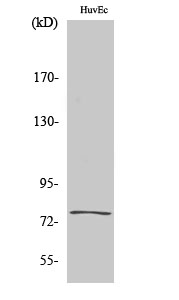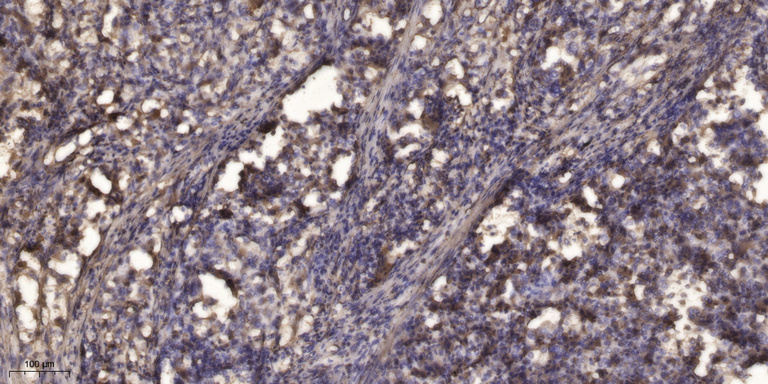KALIG-1 Polyclonal Antibody
- Catalog No.:YT2448
- Applications:WB;IHC
- Reactivity:Human
- Target:
- KALIG-1
- Gene Name:
- KAL1
- Protein Name:
- Anosmin-1
- Human Gene Id:
- 3730
- Human Swiss Prot No:
- P23352
- Immunogen:
- The antiserum was produced against synthesized peptide derived from human KAL1. AA range:151-200
- Specificity:
- KALIG-1 Polyclonal Antibody detects endogenous levels of KALIG-1 protein.
- Formulation:
- Liquid in PBS containing 50% glycerol, 0.5% BSA and 0.02% sodium azide.
- Source:
- Polyclonal, Rabbit,IgG
- Dilution:
- WB 1:500-2000;IHC 1:50-300
- Purification:
- The antibody was affinity-purified from rabbit antiserum by affinity-chromatography using epitope-specific immunogen.
- Concentration:
- 1 mg/ml
- Storage Stability:
- -15°C to -25°C/1 year(Do not lower than -25°C)
- Other Name:
- KAL1;ADMLX;KAL;KALIG1;Anosmin-1;Adhesion molecule-like X-linked;Kallmann syndrome protein
- Observed Band(KD):
- 76kD
- Background:
- Mutations in this gene cause the X-linked Kallmann syndrome. The encoded protein is similar in sequence to proteins known to function in neural cell adhesion and axonal migration. In addition, this cell surface protein is N-glycosylated and may have anti-protease activity. [provided by RefSeq, Jul 2008],
- Function:
- disease:Defects in KAL1 are the cause of Kallmann syndrome type 1 (KAL1) [MIM:308700]; also known as hypogonadotropic hypogonadism and anosmia. Anosmia or hyposmia is related to the absence or hypoplasia of the olfactory bulbs and tracts. Hypogonadism is due to deficiency in gonadotropin-releasing hormone and probably results from a failure of embryonic migration of gonadotropin-releasing hormone-synthesizing neurons. In some patients other developmental anomalies can be present, which include renal agenesis, cleft lip and/or palate, selective tooth agenesis, and bimanual synkinesis. In some cases anosmia may be absent or inconspicuous.,function:May be an adhesion-like molecule with anti-protease activity.,PTM:N-glycosylated.,similarity:Contains 1 WAP domain.,similarity:Contains 4 fibronectin type-III domains.,
- Subcellular Location:
- Cell membrane ; Peripheral membrane protein . Secreted . Proteolytic cleavage may release it from the cell surface into the extracellular space.
- Expression:
- Expressed in the cerebellum (at protein level).
- June 19-2018
- WESTERN IMMUNOBLOTTING PROTOCOL
- June 19-2018
- IMMUNOHISTOCHEMISTRY-PARAFFIN PROTOCOL
- June 19-2018
- IMMUNOFLUORESCENCE PROTOCOL
- September 08-2020
- FLOW-CYTOMEYRT-PROTOCOL
- May 20-2022
- Cell-Based ELISA│解您多样本WB检测之困扰
- July 13-2018
- CELL-BASED-ELISA-PROTOCOL-FOR-ACETYL-PROTEIN
- July 13-2018
- CELL-BASED-ELISA-PROTOCOL-FOR-PHOSPHO-PROTEIN
- July 13-2018
- Antibody-FAQs
- Products Images

- Western Blot analysis of various cells using KALIG-1 Polyclonal Antibody

- Immunohistochemical analysis of paraffin-embedded human Squamous cell carcinoma of lung. 1, Antibody was diluted at 1:200(4° overnight). 2, Tris-EDTA,pH9.0 was used for antigen retrieval. 3,Secondary antibody was diluted at 1:200(room temperature, 45min).



